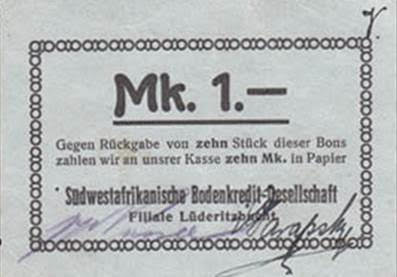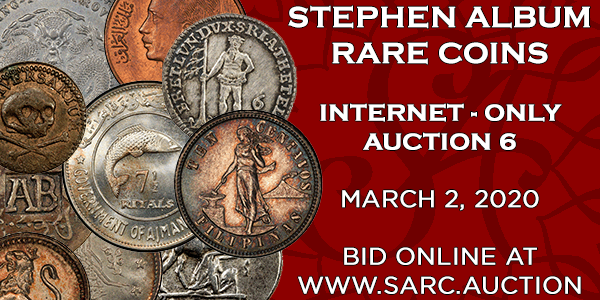
PREV ARTICLE
NEXT ARTICLE
FULL ISSUE
PREV FULL ISSUE
MORE ON SOUTH WEST AFRICA CHITSPablo Hoffman of New York City writes: "Eric Schena's comments in the last E-Sylum led me to offer this short article on a rare and little-known South African series." Thanks! I enjoyed Pablo's email subject line, which won't fit in our headline format: "Swakopmunder Buchhandlung and Südwestafrikanische Bodenkredit-Gesellschaft." -Editor 
Südwestafrikanische Bodenkredit-Gesellschaft 1 Mark The Swakopmunder Buchhandlung chits, or gutschein, comprise an intricate series of German Southwest Africa, and a prohibitively difficult challenge for completists. There are types, varieties of types, and varieties of varieties. I'll guess that no one individual has seen them all, much less collected them all. But there's a little-known sequel to these issues that created an intriguing South African series of extreme rarities. It's probable that one reason the Swakopmunder Buchhandlung gutschein are available to collectors today is because they were fiat currency, i.e., unbacked by hard reserves or deposits, and therefore inconvertible. For that reason the issuer was forced to abruptly halt their production and distribution, as such emissions became banned under orders from the British-backed South African Government's military occupation of German Southwest Africa. South African forces, led by Jan Smuts, victorious in a series of military actions against German and local troops, had taken command of the region. The ban on fiat notes took effect on January 28, 1918, leaving unredeemable Swakopmunder Buchhandlung gutschein, in a multiplicity of denominations and style varieties, scattered throughout the colony. But despite the prohibition against unbacked notes, Swakopmunder Buchhandlung did not end the emission of gutschein. In 1918 they produced a new series, titled with a new issuing authority, Südwestafrikanische Bodenkredit-Gesellschaft (South West African Land Credit Association,) and backed by reserve asset deposits, thereby sidestepping the ban. These appeared only in denominations of 50 pfennig and one mark, and were designated negotiable at the filiale (branch office} in Lüderitzbucht, a distant baytown in the IIKaras Region on the southwestern coast, some 1200 km. south of Swakopmund, on mostly rough roads. The life of the Südwestafrikanische Bodenkredit-Gesellschaft notes was brief. As of January 1, 1919, they were quickly redeemed and replaced by notes of the South African Union. Their redemption would have been virtually complete. Unlike the Swakopmunder Buchhandlung notes, they had the guarantee of hard assets behind them. Their thorough convertibility to the successor South African notes would have left a minuscule few for future discoveries. History was on the march; the fate of the remote and marginally significant colony of German Southwest Africa had been inexorably sealed by the defeat of the German homeland in the macro-event of the first World War. The formal amputation of its colonies was effected by the signing on June 28, 1919, of The Treaty of Versailles. Its Articles 22 and 119 through 127 established South West Africa as a mandate territory under the League of Nations, to be administered by the Union of South Africa. Its inevitable course was thereby set, to be embedded into South Africa and the British Empire. To read the earlier E-Sylum article, see:
 Wayne Homren, Editor The Numismatic Bibliomania Society is a non-profit organization promoting numismatic literature. See our web site at coinbooks.org. To submit items for publication in The E-Sylum, write to the Editor at this address: whomren@gmail.com To subscribe go to: https://my.binhost.com/lists/listinfo/esylum All Rights Reserved. NBS Home Page Contact the NBS webmaster 
|